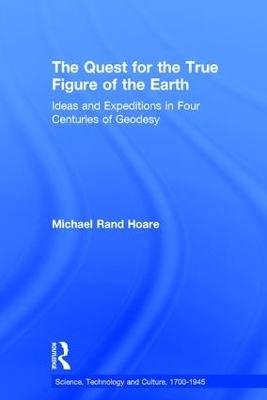
The Quest for the True Figure of the Earth
Ideas and Expeditions in Four Centuries of Geodesy
Seiten
2005
Routledge (Verlag)
978-0-7546-5020-1 (ISBN)
Routledge (Verlag)
978-0-7546-5020-1 (ISBN)
- Titel z.Zt. nicht lieferbar
- Versandkostenfrei
- Auch auf Rechnung
- Artikel merken
Comprehensively explores the 'Figure of the Earth' controversy in all its several dimensions. This book shows how a largely neglected episode of European science, that produced no spectacular process or artefact - beyond a relatively minor improvement in maps - nevertheless represents a combination of theoretical prediction and empirical method.
In the 1730s two expeditions set out from Paris on extraordinary journeys; the first was destined for the equatorial region of Peru, the second headed north towards the Arctic Circle. Although the eighteenth century witnessed numerous such adventures, these expeditions were different. Rather than seeking new lands to conquer or mineral wealth to exploit, their primary objectives were scientific: to determine the Earth's precise shape by measuring the variation of a degree of latitude at points separated as nearly as possible by a whole quadrant of the globe between Equator and North Pole. Although such information had consequences for navigation and cartography, the motivation was not simply utilitarian. Rather it was one theme among many in an intellectual revolution in which advances in mathematics paralleled philosophical strife, and reputations of the living and the dead stood to be elevated or destroyed. In particular the two expeditions hoped to prove the correctness of Isaac Newton's prediction that the Earth is not a perfect sphere, but flattened at the poles. In this study, the 'Figure of the Earth' controversy is for the first time comprehensively explored in all its several dimensions. It shows how a largely neglected episode of European science, that produced no spectacular process or artefact - beyond a relatively minor improvement in maps - nevertheless represents an almost unique combination of theoretical prediction and empirical method. It also details the suffering of the two teams of scientists in very different extremes of climate, whose sacrifices for the sake of knowledge rather than colonial gain, caught the imagination of the literary world of the time.
In the 1730s two expeditions set out from Paris on extraordinary journeys; the first was destined for the equatorial region of Peru, the second headed north towards the Arctic Circle. Although the eighteenth century witnessed numerous such adventures, these expeditions were different. Rather than seeking new lands to conquer or mineral wealth to exploit, their primary objectives were scientific: to determine the Earth's precise shape by measuring the variation of a degree of latitude at points separated as nearly as possible by a whole quadrant of the globe between Equator and North Pole. Although such information had consequences for navigation and cartography, the motivation was not simply utilitarian. Rather it was one theme among many in an intellectual revolution in which advances in mathematics paralleled philosophical strife, and reputations of the living and the dead stood to be elevated or destroyed. In particular the two expeditions hoped to prove the correctness of Isaac Newton's prediction that the Earth is not a perfect sphere, but flattened at the poles. In this study, the 'Figure of the Earth' controversy is for the first time comprehensively explored in all its several dimensions. It shows how a largely neglected episode of European science, that produced no spectacular process or artefact - beyond a relatively minor improvement in maps - nevertheless represents an almost unique combination of theoretical prediction and empirical method. It also details the suffering of the two teams of scientists in very different extremes of climate, whose sacrifices for the sake of knowledge rather than colonial gain, caught the imagination of the literary world of the time.
Dr Michael Rand Hoare is Emeritus Reader at the University of London, UK.
Contents: Author's preface; A dispute in the making; Prelude to an odyssey; Some technicalities; The Lapland expedition; The Peru expedition; Meanwhile in Paris; Death and deliverance; A grievous aftermath; Once more unto the Meridian; A modern postscript; Appendices; Select reading list; Index.
| Erscheint lt. Verlag | 28.11.2005 |
|---|---|
| Reihe/Serie | Science, Technology and Culture, 1700-1945 |
| Verlagsort | London |
| Sprache | englisch |
| Maße | 156 x 234 mm |
| Gewicht | 544 g |
| Themenwelt | Naturwissenschaften ► Geowissenschaften ► Geografie / Kartografie |
| ISBN-10 | 0-7546-5020-0 / 0754650200 |
| ISBN-13 | 978-0-7546-5020-1 / 9780754650201 |
| Zustand | Neuware |
| Informationen gemäß Produktsicherheitsverordnung (GPSR) | |
| Haben Sie eine Frage zum Produkt? |
Mehr entdecken
aus dem Bereich
aus dem Bereich
über eine faszinierende Welt zwischen Wasser und Land und warum sie …
Buch | Hardcover (2023)
dtv (Verlag)
CHF 33,55
Buch | Hardcover (2024)
Schweizerbart'sche, E. (Verlag)
CHF 33,55
Eine Einführung in die spezielle Mineralogie, Petrologie und …
Buch | Hardcover (2022)
Springer Spektrum (Verlag)
CHF 83,95


